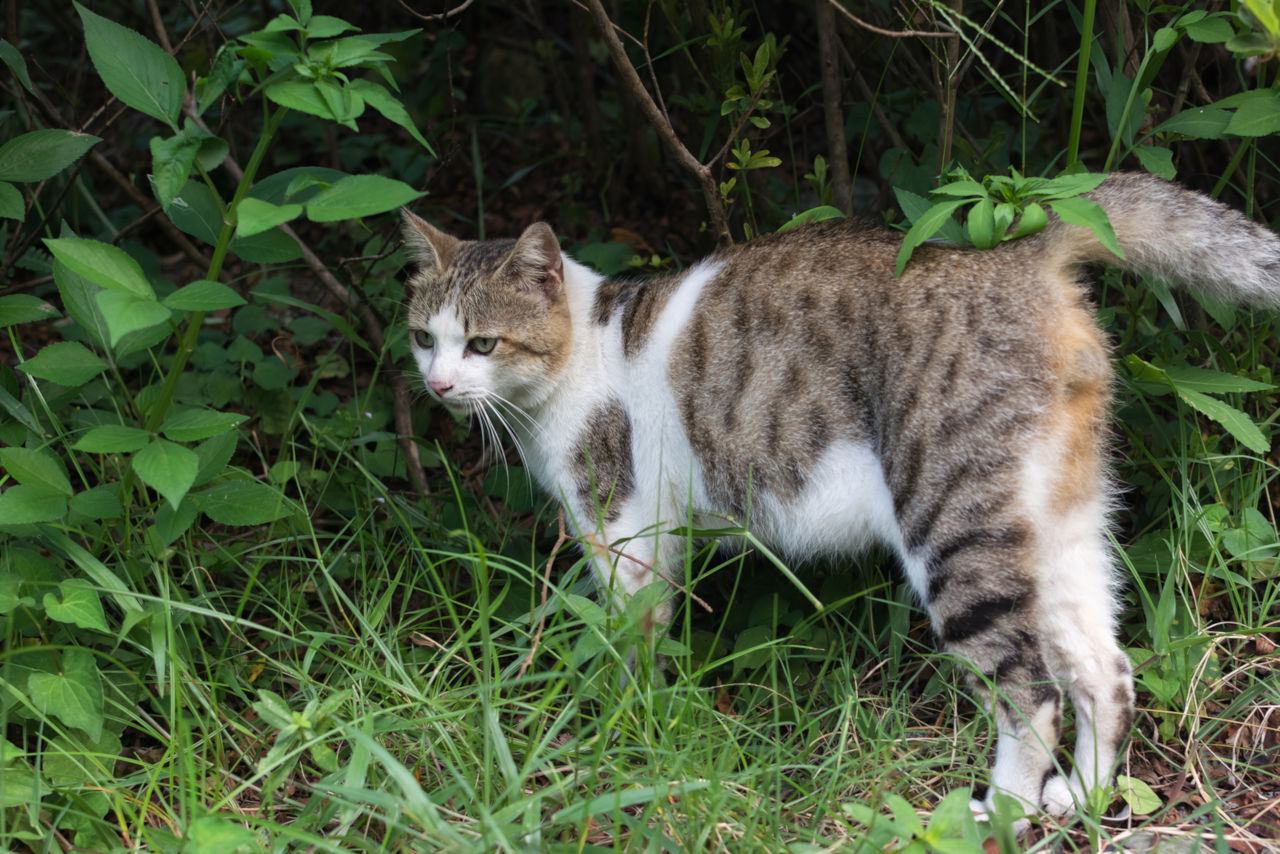Basic instincts guide cats, so your pet cat may disappear for hours or even days. Usually, a cat’s disappearance is due to curiosity, hunting, or territorial instincts. Cats like to explore their territory, which can cause them to wander away from home for a while.
Cats often disappear when they have lost sight of their surroundings while hunting or exploring, and it simply takes some time to find their way home. However, your cat may have taken shelter in a neighbor’s garage or shed and become trapped there. Perhaps your cat has found another home where it can get attention, food, and shelter. When a cat is not well, it may spend days seeking rest and solitude. A cat in heat may also wander in search of a mate.
If you haven’t seen your cat in days, ask your neighbors to check their homes, garages, and yards. Most likely, though, your cat will eventually return and act like it was never gone.
Why Do Cats Disappear for Days?
Cats disappearing from their homes can have several causes. The most common reasons for cats disappearing are:
- The cat is lost
- She is trapped somewhere
- She is overexcited
- The cat is in heat
- She has found another food source
- The cat is sick
Most of the time, cats roam because it is simply their basic instinct. However, there are many other explanations. We will now go into these in more detail.
Is My Cat Lost?
Cats are often said to have a fantastic sense of direction. However, it is difficult to find current scientific evidence for this.
There are older studies on this, for example, in The Scientific Monthly of 1922 and the Journal of Animal Psychology of 1954. What we do know is that cats:
- have an excellent sense of smell
- can remember familiar routes that they consider essential.
From this, we can conclude that a cat should always find its way home if it is within a reasonable distance.
A cat remembers its way when it roams. It may also follow its nose to detect familiar smells.
However, if a cat is frightened or anxious, she may flee. It may also follow its prey into an unfamiliar area and lose its bearings.
This is how cats get lost. Eventually, however, the cat will find a clue or scent and follow it home.
Does My Cat Have Another Food Source?
Cats always remember a reliable source of food. If a neighbor feeds your cat, it may not move too far away from there.
It can be annoying to discover someone else is feeding your cat. You can politely stop the behavior if you find out who is doing it.
Is My Cat Locked Up Somewhere?
A roaming cat will seek shelter from rain, snow, high winds or low temperatures during winter. Cats often hide in nearby garages and sheds or climb under and into vehicles.
Ask your neighbors if your cat has not been seen for several days. The cat may have fallen asleep and trapped in a garage, car, or shed.
Cats look for warmth in the engine compartment of a car. Knock on the bumper before you start your car and ask your neighbors to do the same. Maybe your cat is sleeping on the hood or on one of the wheels.
Does My Cat Need Alone Time?
Cats can also be overstimulated. A cat always needs its own territory in the house. Ideally, this is an otherwise unused room.
Cats often need time to themselves. Therefore, there may be times when your cat hides in the dark.
If your home does not provide a place for a retreat and solitude, your cat will seek it elsewhere. A cat will not return home until it feels ready to do so.
Stimulus overload in cats usually results from an excess of:
- attention
- contact
- Noise
- Strong smells
Noise is the main reason a cat wants to spend time alone. Noise causes anxiety, which is detrimental to the cat’s health. Excessive noise can even damage the cat’s hearing.
Make sure your cat always has a place to escape. Also, make sure she has a place to be left alone, especially if you have children. An overstimulated cat is more likely to avoid your home.
Is My Cat in Heat?
Cats in heat will wander until they find a mate. Your cat will cry and whine until she is let out.
If this is the case, you should consider spaying or neutering. Cats go into heat several times a year.
Aside from begging to be let outside, a cat in heat will exhibit the following behaviors:
- Increased attachment
- Spraying urine and other increased territorial behavior
- Rolling on the floor
- Lifting of hind legs and buttocks.
Once a cat in heat is outside, it will search for a mate. This can take hours or days. It depends on how long it takes to find a suitable mate.
Once the mating is complete, your cat will lose interest and return home.
Is My Cat Sick?
Cats like to be alone when they are sick. This is part of their survival mechanism.
Cats don’t want rivals or predators to notice that they are unwell. This is because it is considered a sign of weakness, showing they are vulnerable.
Because cats exhibit territorial and hierarchical behavior, there is a risk that a rival cat will displace a sick cat.
Watch for signs of illness in your cat. Don’t wait for her to ask you for help because that’s unlikely.
Watch for these signs:
- Loss of appetite
- Incontinence
- Limited mobility
- Aversion to the litter box
- Uncharacteristic aggression
- Snarling and whining when touched.
Your cat may also be nearing the end of its life. Cats often retreat and seek a quiet place to die. Unfortunately, under these circumstances, your cat will never return.
How Far Do Cats Stray from Their Homes?
According to scientific research, cats can wander up to 20 miles (30 km) per week.
Of course, that doesn’t mean you have to walk 20 miles to find your cat. Most cats stay within 700 ft. (200 meters) of their home.
How far a cat will wander depends on the following factors:
- Hunting instinct
- Binding to the owner
- routine
- Environmental conditions
- Desire for territory
- level of trust
A cat with a strong prey drive may wander further. These cats stalk birds, mice, and other small animals.
This creates a kind of tunnel vision. The cat loses sight of its surroundings because it focuses on the prey.
It may take some time before a cat pounces on its prey. By the time it does, it may be far from home.
This can be confusing for the cat, so it must find a familiar sight or smell before returning home.
Do Neutered Cats Disappear?
Neutering does not affect a cat’s hunting instinct. This means that she can continue to roam.
However, your cat will probably stay closer to the house. You can also continue to curb their hunting instincts through play sessions.
However, a neutered cat no longer has a desire to mate. This eliminates one of the reasons she goes outside and roams.
Neutered cats are less territorial, so they don’t roam as much.
How to Keep Cats from Roaming
Roaming is a natural instinct of almost all cats. Therefore, you should rather keep your cat indoors if you don’t want it to.
You can also take various measures to make this more comfortable for your pet. These include other measures besides neutering:
- A comfortable home environment
- A set and reliable routine
- Regular play to mimic chasing.
Convince your cat that her home is the best place.
Make sure she has her quiet time when she needs it and that she gets attention when she needs it.
Good food and a clean litter box are also important.
Getting your cat used to a regular daily routine will make her feel more comfortable. Make it clear to your cat that she will be fed, petted, and played with at certain times of the day.
Most cat toys mimic the experience of chasing in some way. Play actively with your cat twice a day for at least 10 to 15 minutes.
This will satisfy your cat’s hunting instinct. It means she will prefer to stay home.
Hunting games also leave a cat exhausted and less likely to explore the outside.
Summary: Why Do Cats Disappear for Several Days?
It occasionally happens that cats disappear for several days. However, most of the time, this is not a reason to worry.
There are several reasons for this behavior. First of all, it is essential to know that roaming is part of the natural behavior of cats.
But it could also be that your cat is lost, locked up somewhere, or needs her rest. She could also be in heat or sick.
She may also stay away for several days if she has found another food source.
In most cases, however, a cat will return home after a while. She then behaves as if she had never been away.


